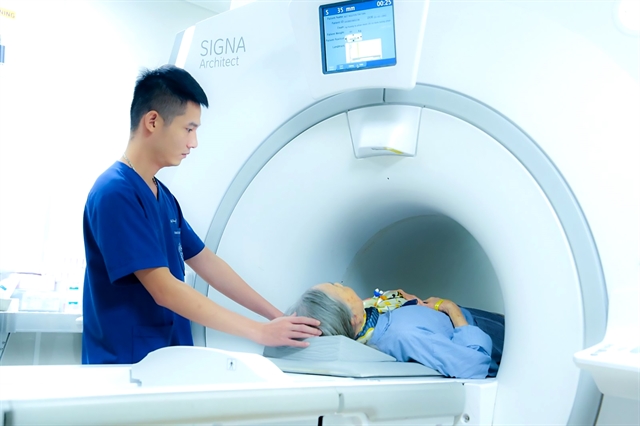 Society
Society

 |
| Modern technology helping medical staff serve a patient in the Hà Nội-based Friendship Hospital.—Photo coutersy of the Friendship Hospital |
HÀ NỘI — Hospitals and healthcare workers are undergoing significant changes, embodying a spirit of bold innovation and action, with a strong push towards adopting new technology and digital transformation.
Recently, the Hà Nội-based Friendship Hospital made a notable breakthrough in diagnosis and treatment with the inauguration of its 3.0 Tesla Magnetom Lumina and 1.5 Tesla Magnetom Sempra MRI systems.
The MRI system is a high-end diagnostic imaging tool capable of integrating advanced artificial intelligence (AI) technology along with several software updates from prior versions.
These updates include software for brain vessel imaging without the need for contrast agents, imaging cerebral blood flow, nerve fibre and nerve conduction evaluations, brain tumour assessment software, tumour perfusion imaging, heart imaging, breast cancer assessment, joint and cartilage damage evaluation, vascular imaging and spinal assessments.
The features allow the MRI system to generate 3D images with superior anatomical detail, ensuring more accurate diagnoses than standard MRI devices.
According to the hospital's leadership, the facility was one of the first institutions to equip itself with the state-of-the-art MRI system, aiming to better serve patients.
Leaders at the Friendship Hospital also noted increasing demand for diagnosis and treatment, which has led to a surge in the volume of medical images requiring processing.
The need to detect complex and obscure medical conditions has also continued to rise.
Advanced imaging systems, such as MRI and CT systems -- which provide high-resolution images -- require the management of larger data sets, placing significant pressure on medical staff to handle higher workloads.
The rapid development of technology and the growing demands for image processing and analysis has accelerated the need for AI applications in medical imaging.
Hospital director Nguyễn Thế Anh said the hospital had implemented MRI machines with AI applications to meet the demands of modern healthcare and to align with the nation's innovation and digital transformation efforts to better serve patients.
Previously, the facility also pioneered paperless hospital systems, progressively integrating technology into its healthcare practices.
For example, the hospital’s management software has been fully integrated with outpatient records and patient admissions, which are updated daily in the Health Insurance Information System.
Additionally, the hospital has introduced telemedicine services, remote consultations and technology for optimising drug usage in clinical settings.
Non-cash payments and the gradual implementation of electronic health records are also being prioritised and expanded.
Similarly, Bạch Mai Hospital has also launched an electronic health record system, marking a significant leap forward in modernising healthcare processes, improving medical records management, enhancing service quality and refining patient experiences.
Bạch Mai Hospital is the first specialty hospital to officially implement electronic health records.
Đào Xuân Cơ, director of the Bạch Mai Hospital, said that the digital transformation was an inevitable trend and a strategic priority for rapid and sustainable development.
Recognising the importance of digital transformation in both medical specialties and administrative procedures, the hospital has already issued several decisions to guide and approve digital transformation tasks in the near future.
Early last year, the hospital began transitioning its medical software and rolled out its electronic health records system.
By July 1, 2024, Bạch Mai successfully integrated its data with the Việt Nam Social Security Portal, and later that month the hospital piloted the electronic health records system in six units, he said.
Spirit of bold innovation
Particularly amid many challenges in the healthcare sector, the bold, forward-thinking attitude of hospital leaders and staff is a crucial factor in the growth and development of healthcare institutions.
Friendship Hospital director Anh said that the facility has issued numerous resolutions guiding the preparation and implementation of procurement tenders -- including those funded by the post-COVID-19 recovery programme -- to equip itself with modern devices, medicines, chemicals and medical equipment.
The procurement process for drugs, chemicals, medical supplies and equipment has been strictly followed, enabling timely service for diagnosis and treatment while minimising equipment malfunctions and shortages.
The hospital is also actively investing in infrastructure repairs and upgrades, Anh said.
Notably, it is renovating buildings and progressing with its "High-Quality Care and Treatment Centre" project, which has been submitted to the Ministry of Construction and Ministry of Health for approval.
“The success so far is due to the collective spirit of unity, enthusiasm and responsibility, with a shared commitment to building and developing the hospital,” the hospital director said.
Minister of Health Đào Hồng Lan said that information technology and digital transformation have played a critical role in driving major changes in the healthcare sector.
She stressed that hospitals implementing digital transformation and IT solutions must prioritise patient-centred approaches, ensuring that the people they serve are the focus of advancements.
Digital transformation should not be the responsibility of IT departments alone, but requires the involvement of all hospital units and staff.
Hospital leaders at every level, including Party committees and hospital directors, play a decisive role in the transition.
The application of new technologies, such as AI, is also essential for improving the quality, efficiency and effectiveness of patient care, ultimately benefitting the public. VNS




